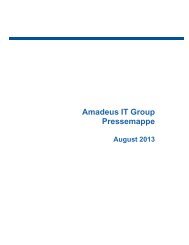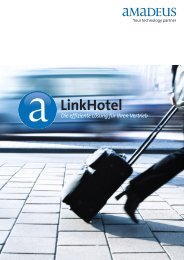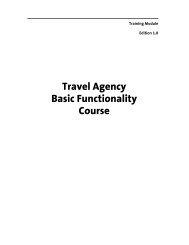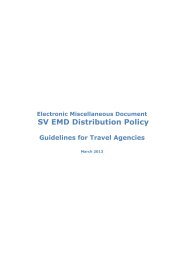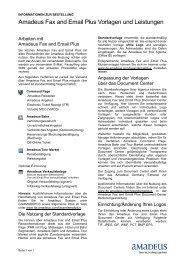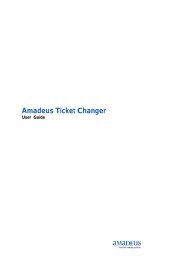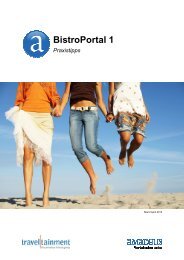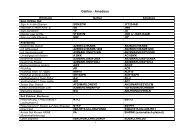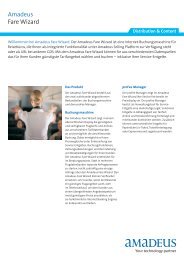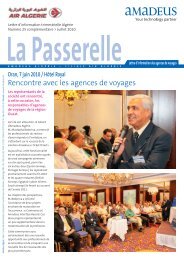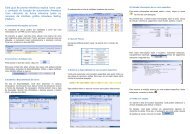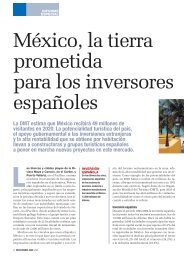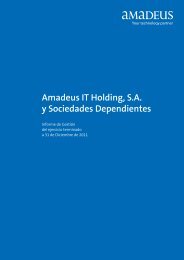Opportunities and Best Practices for Travel Agencies - Amadeus
Opportunities and Best Practices for Travel Agencies - Amadeus
Opportunities and Best Practices for Travel Agencies - Amadeus
Create successful ePaper yourself
Turn your PDF publications into a flip-book with our unique Google optimized e-Paper software.
Service Fees <strong>and</strong><br />
Commission Cuts<br />
<strong>Opportunities</strong> <strong>and</strong> <strong>Best</strong> <strong>Practices</strong><br />
<strong>for</strong> <strong>Travel</strong> <strong>Agencies</strong><br />
June 2007
2<br />
Index<br />
Executive Summary 3<br />
Introduction 4<br />
The end of airline commission 4<br />
Disappearance of airline commission across markets 6<br />
Consequences <strong>for</strong> the travel agency business 7<br />
Some useful definitions 8<br />
Distribution: new models, new entrants, new solutions 9<br />
The growing independence of airlines 9<br />
The Internet continues to change the rules 10<br />
The rise of the consumer 10<br />
The travel agency business-mix 11<br />
Successful travel agencies apply effective service-fee schemes 13<br />
The US agency marketplace: from fear to success 13<br />
Sc<strong>and</strong>inavia leads the way in Europe 14<br />
German business travel agencies: the rise of the transaction-fee model 16<br />
In summary: key market trends 17<br />
Types <strong>and</strong> levels of service fees charged 18<br />
Serving the customer in a changed travel environment 19<br />
Customise your service fees 20<br />
Communicate fees openly 21<br />
Recommendations 22<br />
Main conclusions 23<br />
Bibliography 24<br />
About this paper<br />
This research was conducted in 2007 by <strong>Amadeus</strong> <strong>and</strong> is based on existing studies,<br />
press releases <strong>and</strong> third party research papers made worldwide on service fees over<br />
the last 3 years. The purpose of this paper is to help travel agencies underst<strong>and</strong> how<br />
they can optimise their business <strong>and</strong> improve their profitability after airlines have<br />
reduced or eliminated travel agency commission. It provides the most up-to-date<br />
in<strong>for</strong>mation on service fee policies available today <strong>and</strong> describes opportunities <strong>for</strong><br />
travel agencies to add value to their services.
Executive Summary<br />
Service Fees <strong>and</strong> Commission Cuts<br />
The reduction or removal of airline commission continues to challenge travel agencies'<br />
profitability. It is crucial to underst<strong>and</strong> what trends travel agencies need to be aware of<br />
to ensure that they stay ahead of the game <strong>and</strong> one step ahead of their competitors.<br />
This paper will focus on how to optimise profitability <strong>and</strong> increase travel agencies’<br />
revenues with service-fee models.<br />
> Service fees help travel agencies increase their revenue<br />
Service fees are not only a way to compensate <strong>for</strong> the loss of airline commission but<br />
also a way to generate new revenue sources <strong>for</strong> travel agencies that guarantee their<br />
long-term profitability. Indeed research conducted in 2006 by Hermes Consulting<br />
reports that 73% of the total revenue of Sc<strong>and</strong>inavian business travel agencies comes<br />
from service fees.<br />
> Successful travel agencies apply effective service-fee schemes<br />
Many travel agencies are exp<strong>and</strong>ing their service-fee models, both in terms of the<br />
amounts charged <strong>and</strong> the number of services <strong>for</strong> which they charge fees.<br />
As service fees are a valuable source of revenue, they have become much stricter<br />
when applying fees <strong>and</strong> now avoid waiving fees wherever possible.<br />
> Airline related fees are still top of the list<br />
<strong>Travel</strong> agents apply fees most often <strong>for</strong> airline related services. They charge<br />
differentiated fees depending on the destination, type of reservation (e.g. frequent<br />
flyer), number of tickets sold or type of airline (e.g. full service versus “no frills”).<br />
> Service fees increase customer loyalty <strong>and</strong> satisfaction<br />
Despite common perception, charging service fees does not result in a loss in clients.<br />
In the US, travel agencies apply the highest number of service fees.<br />
Nevertheless, in 2005, they reported a 90% customer retention rate.<br />
Besides, fees can be tailored to suit individual customers. This helps travel agencies<br />
target their customers with tailored services based on their past purchasing patterns<br />
<strong>and</strong> identify services <strong>for</strong> which customers’ willingness to pay is greater, such as trip<br />
planning, hotel only or special promotions.<br />
The revenue mix <strong>for</strong> travel agencies is increasingly shifting to service fees as airlines<br />
have lowered or cut commissions. With markets such as the US or Sc<strong>and</strong>inavia which<br />
are far ahead in this trend, successful travel agencies in many European countries are<br />
fast adopting, <strong>and</strong> constantly upgrading, their service-fee schemes.<br />
3
Service Fees <strong>and</strong> Commission Cuts<br />
4<br />
> By cutting agents' commission,<br />
airlines decrease their<br />
dependence on travel agents as<br />
a distribution channel.<br />
Introduction<br />
The end of airline commission<br />
For more than 20 years, travel agencies had a monopoly on two aspects of air travel:<br />
in<strong>for</strong>mation <strong>and</strong> ticketing.<br />
Now they have lost these monopolies: in<strong>for</strong>mation is plentiful <strong>and</strong> tickets are more <strong>and</strong><br />
more irrelevant.<br />
By cutting agents' commission, airlines decrease their dependence on travel agencies<br />
as a distribution channel. The process started in the US in 1995 when seven airlines,<br />
(American, Delta, US, Trans World, United, Northwest <strong>and</strong> Continental Airlines) joined<br />
<strong>for</strong>ces to put a cap on commissions paid to travel agencies. They set an upper limit <strong>for</strong><br />
travel agents’ commissions fixed at 50 USD <strong>for</strong> domestic flights 1 , <strong>and</strong> at 100 USD in 1998<br />
<strong>for</strong> international flights.<br />
In October 1999, airline commissions were reduced to 5% <strong>and</strong> finally eliminated in the US<br />
in March 2002 (on average, one commission cut every 14 months).<br />
Three key variables triggered the end of the commission model:<br />
> The unsustainable financial losses by airlines due to the growth of low-cost<br />
carriers (LCCs) leading to an increase in the number of bankruptcies.<br />
> No negative consequences from previous commission cuts: airlines had<br />
progressively lowered the commission payments starting in February 1995.<br />
> No effective recourse <strong>for</strong> travel agencies (group actions prohibited by US law).<br />
The effect was a loss of one third of operating travel agency locations in the United States.<br />
In 2000 there were more than 30 000 retail travel agency locations;<br />
in 2005 just after the last commission cut, slightly fewer than 21 000.<br />
In Europe, airline commission had remained unchanged (9%) <strong>for</strong> more than 15 years. The<br />
first difficulties appeared with the liberalisation of airline transportation <strong>and</strong> domestic air<br />
services.<br />
The main consequences were:<br />
> The appearance of new airlines <strong>and</strong> new air routes.<br />
> An increase in the number of bankruptcies.<br />
> New competition <strong>for</strong>ced down air fares.<br />
> The development of LCCs (e.g. Easyjet) following the example of Southwest in<br />
the US.<br />
> The necessity to cut production costs especially with the development of LCCs,<br />
with "low-cost" meaning low production costs <strong>and</strong> not low fares, even if the two are<br />
closely linked.<br />
1 This new step meant that travel agencies received a 10% commission on all tickets up to 500 USD. Anything over 500 USD was<br />
limited to a 50 USD commission. The 50 USD cap was immediately adopted by all the other major airlines except Alaska, TWA <strong>and</strong><br />
Southwest.
Service Fees <strong>and</strong> Commission Cuts<br />
Thus in Europe, travel agents’ commission fell progressively from 9% to 7% in a first<br />
wave between 1997 <strong>and</strong> 1999, followed by another wave of decreases after 2001.<br />
Since 1 January 2003, commissions have virtually disappeared from the Sc<strong>and</strong>inavian<br />
market. The process was faster in Europe than in the US which explains the greater<br />
difficulties European travel agencies have faced in adapting to this new environment.<br />
This could have been a dangerous game <strong>for</strong> airlines if only one of them decided to<br />
bypass its intermediaries, who could then have gone to the competition.<br />
But all airlines were in favour of zero commission which will come into general use<br />
sooner or later. The unknown element is the adaptation time required by customers<br />
<strong>and</strong> their travel agents to the new distribution models creating a confusing<br />
environment.<br />
Some airlines still pay domestic commission 2 but they are also moving slowly towards<br />
zero commission. CSA Czech Airlines, <strong>for</strong> example, has already started to decrease<br />
agents’ commission.<br />
2 Countries in Europe where airlines still pay domestic commission: Portugal (TAP - Air Portugal) with 1% (but 0% in Germany),<br />
Irel<strong>and</strong> (Aer Lingus) 1% since 2003, Italy (Alitalia) 1% since 2004 (but 0% in UK), Austria (Austrian Airlines) 1 % since 2006, Romania<br />
(Tarom) 1% since 2006 (but 0% in Germany), Greece (Olympic Airways) between 6.94% <strong>and</strong> 8.5% depending on the destination <strong>and</strong><br />
type of flight, Cyprus (Cyprus Airways) <strong>and</strong> Croatia (Croatia Airlines) with 7%, Pol<strong>and</strong> (LOT Polish Airlines) 1% since 2004 (but 0% in<br />
Germany), Spain (Iberia) with 0.4% since January 2007.<br />
5
Service Fees <strong>and</strong> Commission Cuts<br />
6<br />
Disappearance of commission across markets<br />
Domestic commission cuts across markets<br />
Airline Date<br />
Domestic<br />
Commission Level<br />
United States Delta 2002 0%<br />
Irel<strong>and</strong> Aer Lingus 2003 1%<br />
Finl<strong>and</strong> Finnair 2003 0%<br />
Netherl<strong>and</strong>s KLM 2003 0%<br />
Sc<strong>and</strong>inavia SAS 2003 0%<br />
Russia Aeroflot Russian Airlines 2004 0%<br />
Italy Alitalia 2004 1%<br />
Pol<strong>and</strong> LOT Polish Airlines 2004 1%<br />
Germany Lufthansa 2004 0%<br />
France Air France 2005 0%<br />
United Kingdom British Airways 2005 0%<br />
Belgium SNBrussels Airlines 2005 0%<br />
Austria Austrian Airlines 2006 1%<br />
Romania Tarom 2006 1%<br />
Spain Iberia 2007 0.4%
New environment<br />
<strong>Travel</strong> agencies are at a<br />
competitive disadvantage<br />
with regard to suppliers’ direct<br />
websites where airlines are able<br />
to control seat availability <strong>and</strong><br />
prices.<br />
Fees <strong>for</strong> services<br />
Most travel agents have managed<br />
the commission cuts by migrating<br />
to a “fees <strong>for</strong> services” business<br />
model - applying charges to each<br />
transaction.<br />
Service Fees <strong>and</strong> Commission Cuts<br />
Consequences of commission cuts <strong>for</strong> the travel agency business<br />
According to a survey conducted by <strong>Amadeus</strong> among 600 <strong>Amadeus</strong> travel agencies<br />
customers <strong>and</strong> prospects, 34% of the interviewees quoted the “reduced revenues from<br />
commission” as their biggest challenge. Indeed the decision by the airlines to reduce<br />
<strong>and</strong>/or eliminate travel agency commission has led them to use technology that many<br />
of them distrust or are not inclined to use, <strong>and</strong> to compare prices <strong>and</strong> travel schedules<br />
constantly. As a result of this new environment, traditional travel agencies are at a<br />
competitive disadvantage with regard to online travel agencies <strong>and</strong> to airline carriers<br />
which have developed their own direct websites where they are able to control seat<br />
availability <strong>and</strong> prices. Nevertheless, travel agents’ pay programmes remain. From some<br />
airlines, travel agents receive negotiated incentive commission closely linked to their<br />
per<strong>for</strong>mance. Airlines also consider passing part of the GDS fees on to the agencies as<br />
incentives.<br />
To reduce their reliance on airline commission payments, travel agencies are applying one<br />
or more of the following strategic options:<br />
a. streamlining their operations, controlling staff costs whilst ensuring the customer<br />
feels as little impact as possible;<br />
b. exp<strong>and</strong>ing or moving into the leisure business where commissions on non-air<br />
products remain high (cruise, hotel, etc);<br />
c. specialising in geographic areas or becoming niche players <strong>for</strong> specific leisure<br />
products (e.g. destination weddings, student travel, group travel, cruises only, etc.);<br />
d. establishing a service fee driven business model.<br />
This paper will focus on the strategic option: establishing a service fee driven business<br />
model - applying charges to each transaction. Indeed this choice has the added benefit of<br />
putting an explicit value on the service they provide to their customers.<br />
Hence in some countries such as the US or Sc<strong>and</strong>inavia, travel agents have already<br />
developed effective service-fee schemes <strong>and</strong> are constantly searching <strong>for</strong> solutions to<br />
generate more revenues. The whole travel agency profession is going through a transition<br />
where travel agents are in a state of managing the unknowable. The structural changes<br />
that are taking place in the industry are such that travel agents need to be able to provide<br />
added value <strong>for</strong> which they can charge the client <strong>and</strong> a lot of them are now doing better<br />
than they were be<strong>for</strong>e commission was cut. However, fees have raised the total cost of<br />
travel <strong>for</strong> the traveller <strong>and</strong> customers are unwilling to pay <strong>for</strong> a service they did not have<br />
to pay <strong>for</strong> in the past.
Service Fees <strong>and</strong> Commission Cuts<br />
8<br />
Definitions<br />
> Service Fee<br />
> Transaction Fee<br />
> Management Fee<br />
What is specific to business or corporate travel?<br />
The amount of commission paid by airlines has a direct impact on corporate travel<br />
buyers. This is because business travel agencies usually pass their commission<br />
receipts on to larger clients. The clients have in turn effectively treated the fee as<br />
a subsidy <strong>for</strong> their travel management programme, with a profit remaining even<br />
after paying the fee. From now on, the fee will be greater than the commission, so a<br />
company’s travel costs will no longer be offset by commissions; indeed travel costs are<br />
<strong>for</strong>ced upwards by the addition of service fees.<br />
But certain characteristics of the business travel market allowed this sector to<br />
adapt more easily to the disappearance of commission. Business travel agencies<br />
have always had different relationships with different customers; they usually have<br />
long-term buyer relationships, set up long be<strong>for</strong>e the commission cap. Some of them<br />
quickly renegotiated their contracts to include a transaction or management fee,<br />
knowing that the majority of these fee arrangements are specific to the needs of the<br />
client.<br />
This situation made the transition to zero commission somewhat easier <strong>for</strong> a lot of<br />
them. Besides, they do not see themselves as airline ticket distribution outlets but are<br />
good at managing corporate travel expenses. They track <strong>and</strong> manage costs, ensure<br />
that corporate policies are applied, negotiate special fares arrangements <strong>and</strong> are seen<br />
as an in<strong>for</strong>mation centre <strong>for</strong> employees <strong>and</strong> managers.<br />
In the first part of this paper we will analyse the changes resulting from the loss of<br />
airline commission in the travel industry <strong>and</strong> underst<strong>and</strong> the direct consequences <strong>for</strong><br />
distribution. Then we will look at the countries that have applied service-fee models<br />
successfully in order to propose some recommendations. The last part will focus on<br />
best practices used to increase customer acceptance.<br />
Some useful definitions<br />
In this paper, we have identified three different types of fees: service fees, transaction<br />
fees <strong>and</strong> management fees:<br />
> Service fee: this is a generic term commonly used to define booking fees.<br />
A “service fee” is the amount of money charged by the travel agency to the travel<br />
buyer (consumer or corporation) <strong>for</strong> services provided in addition to the actual product<br />
purchased (hotel booking, air ticket, etc.). In this instance, the full commission (when<br />
it exists) is passed back to the customer.<br />
> A transaction fee is the agreed amount of money charged by the travel agency <strong>for</strong><br />
each transaction; that is <strong>for</strong> every single action or operation which is per<strong>for</strong>med to<br />
achieve the booking. A transaction fee is designed to cover a travel agency’s<br />
operational costs <strong>and</strong> includes a profit margin.<br />
> A management fee represents a fixed amount of money (percentage or flat fee)<br />
added on top of the invoice based on different criteria, regardless of either transaction<br />
or volume. This fee is totally independent from the relationships between the travel<br />
agency <strong>and</strong> its suppliers. For example, it can be the agreed amount of money charged<br />
by the travel agency <strong>for</strong> a specific period (per month, per year, etc.).
Airlines adopted<br />
three different<br />
strategies:<br />
> Reduce GDS fees<br />
> Disintermediation<br />
> Cut airline commissions<br />
Service Fees <strong>and</strong> Commission Cuts<br />
Distribution: new models, new entrants,<br />
new solutions<br />
The growing independence of airlines<br />
To face uncontrollable costs such as petrol costs <strong>and</strong> to recover from years of operating<br />
losses, airlines have been <strong>for</strong>ced to cut distribution expenses in different areas.<br />
In terms of distribution costs, airlines are employing three different strategies:<br />
> Reduce GDS fees <strong>and</strong> progressively find agreements with the global GDSs.<br />
> Disintermediation: go direct <strong>and</strong> bypass the established distribution chain by<br />
developing their own websites.<br />
> Reducing or removing commission paid to travel agencies.<br />
The decision to cut travel agencies’ commission clearly shows that airlines wanted to<br />
decrease their reliance <strong>and</strong> dependence on travel agencies as a distribution channel.<br />
In this context, the Internet appears to be an efficient <strong>and</strong> cost-effective distribution<br />
channel.<br />
By creating their own web sites <strong>and</strong> selling directly to their customers, airlines are able<br />
to control seat availability <strong>and</strong> prices to their advantage <strong>and</strong> they have finally become<br />
even more successful than other supplier groups at bringing consumers to their web<br />
sites.<br />
9
Service Fees <strong>and</strong> Commission Cuts<br />
10<br />
The Internet continues to change the rules<br />
With the Internet, the <strong>for</strong>mer travel marketplace has been completely changed.<br />
It allows travel suppliers to directly reach their potential customers through their own<br />
websites, <strong>and</strong> cut back on the commission they pay by having the ability to direct<br />
source <strong>and</strong> direct market. Also it allows real-time price changes. This threatens the<br />
traditional travel agency’s business model <strong>and</strong> makes it harder <strong>for</strong> them to consistently<br />
offer lower prices.<br />
Recent research conducted by Burst Media shows that the Internet is more <strong>and</strong> more<br />
used as the main travel planning resource. This means that online travel agencies<br />
compete with traditional travel agencies with regard to the products sold but also the<br />
services they provide. Indeed, according to the Manager of Market Research, Burst:<br />
“<strong>Travel</strong>lers have flocked to the Internet – actively using it as an in<strong>for</strong>mation resource<br />
<strong>and</strong> a place to make travel purchases”.<br />
In 2007, online booking travel will represent more than 30% of all travel booked in<br />
Europe. According to Forrester Research 3 (February 2007), amongst the European<br />
travellers who research their leisure trips via the Internet, 40% book their trip online<br />
<strong>and</strong> 27% buy from offline points of sale.<br />
The rise of the consumer<br />
Thanks mainly to the Internet, travel consumers have access to more in<strong>for</strong>mation, can<br />
exchange this in<strong>for</strong>mation more easily <strong>and</strong> there<strong>for</strong>e have a much greater influence<br />
over the online <strong>and</strong> offline content. They are driving change.<br />
The way travel agencies will deal with their suppliers <strong>and</strong> direct competitors will be<br />
defined by their ability to react to these expectations <strong>and</strong> meet the needs of this new<br />
generation of sophisticated consumers.<br />
However this abundance of in<strong>for</strong>mation can create confusion <strong>for</strong> customers. Indeed<br />
the more they have access to a lot of in<strong>for</strong>mation (in terms of prices, travel suppliers'<br />
policies, type of packages, etc), the more they will need advice to make a choice.<br />
The boom of the Internet <strong>and</strong> the easy access to in<strong>for</strong>mation could be to the advantage<br />
of the travel agent who is the best person to find the right in<strong>for</strong>mation <strong>and</strong> give<br />
unbiased consultancy. The competitive advantage of the travel agent will be to provide<br />
expertise <strong>and</strong> experienced consultancy to meet the needs of a specific traveller.<br />
3 “Forrester Research Inc. is an independent technology <strong>and</strong> market research company that provides advice to global leaders in<br />
business <strong>and</strong> technology.”
Car Rental<br />
Air Sales<br />
Hotel Bookings<br />
Tour Sales<br />
Resort Sales<br />
Cruise<br />
The travel agency business-mix<br />
Service Fees <strong>and</strong> Commission Cuts<br />
A typical travel agency in the US, making 80% of its revenue in the leisure business,<br />
has seen its business mix change over recent years. Indeed, as agencies try to reduce<br />
their reliance on air ticket sales, they are constantly moving towards non-air bookings.<br />
Research data in the US <strong>and</strong> in some European countries shows a relationship between<br />
airline cuts <strong>and</strong> the decrease in the number of air ticket sales to the advantage of<br />
tour packages <strong>and</strong> cruise sales. This development is very clear in the United States<br />
(ASTA 4 , 2006) where, in 2004, air ticket sales were not the main component of travel<br />
agency sales whereas tour package sales exceeded air sales figures.<br />
Segment Segment sales, sales, US U.S. travel travel agent agent expectations expectations<br />
<strong>for</strong><br />
<strong>for</strong><br />
sales<br />
sales<br />
volume<br />
volume<br />
increase<br />
increase<br />
45%<br />
50%<br />
Source: <strong>Travel</strong> Weekly's 2004 US <strong>Travel</strong> Industry Survey.<br />
65%<br />
70%<br />
72%<br />
83%<br />
A survey conducted by <strong>Amadeus</strong> among 600 <strong>Amadeus</strong> travel agencies customers <strong>and</strong><br />
prospects found that 34% cited “reduced revenues from commission” as the biggest<br />
challenge facing their business today; 27% cited “increased competition from the<br />
Internet”. To face these changes, their main strategy is <strong>for</strong> 49% of respondents to<br />
“focus on revenue growth” <strong>and</strong> 19% on “online development”.<br />
What is the biggest challenge facing your business today?<br />
> Reduced Revenue from Commission<br />
- 34%: Global figures<br />
- 50%: Western Europe figures<br />
What is the main strategy <strong>for</strong> your agency?<br />
> Revenue Growth<br />
- 49%: Global<br />
- 47%: Western Europe<br />
Source: <strong>Amadeus</strong> Research 2006.<br />
4 ASTA: American Society of <strong>Travel</strong> Agents. ASTA agencies mostly concentrate on the domestic market (the US <strong>and</strong> Canada).<br />
43% concern international bookings <strong>and</strong> 67% domestic. They are mostly leisure oriented (76% of their total business).<br />
11
Service Fees <strong>and</strong> Commission Cuts<br />
12<br />
These results show that Western European countries were significantly impacted by<br />
the loss of airline commission. In 2006, Gfk 5 conducted a survey among 988 French<br />
travel agencies to analyse the impact of the end of the commission model:<br />
Impact of airline commission cut<br />
Impact of airline commission cut<br />
Very strong impact<br />
Moderate impact<br />
Low impact<br />
Source: Gfk Survey of 988 French travel agencies, 2006.<br />
43 %<br />
29 %<br />
28%<br />
French travel agencies have found some answers, however these are still in need of<br />
rein<strong>for</strong>cement:<br />
> Following the agreement between the SNAV (French Association <strong>for</strong> <strong>Travel</strong><br />
<strong>Agencies</strong>) <strong>and</strong> Air France, the airline will still pay a kind of commission up to 0.6%<br />
of generated turnover to help travel agencies deal with the end of commission.<br />
> Alignment of small agents with networks <strong>and</strong> online sales.<br />
> Development of alliances to increase bargaining power <strong>and</strong> negotiate special fare<br />
rates with suppliers.<br />
> Introduction of fee schemes with business travel agencies more inclined to pay <strong>for</strong><br />
travel agencies’ services.<br />
But what about the other countries that have successfully experienced the loss of<br />
commission <strong>and</strong> applied service-fee policies?<br />
5 The Gfk (Growth From Knowledge) Group is the No. 4 market research organisation worldwide. The Group has 130 companies<br />
located in 70 countries.
96.8% of ASTA members<br />
reported that in 2005 they<br />
charged fees <strong>for</strong> at least some<br />
client services.<br />
United States<br />
Sc<strong>and</strong>inavia<br />
France<br />
United Kingdom<br />
Spain<br />
Service Fees <strong>and</strong> Commission Cuts<br />
Successful travel agencies apply effective<br />
service-fee schemes<br />
The loss of commission has prompted travel agents to raise fees <strong>for</strong> the tickets they<br />
sell <strong>and</strong> to stress how they help customers in ways that others don’t. Service fees are<br />
not only a way to compensate <strong>for</strong> the loss of airline commission but also a way to<br />
generate new revenue sources <strong>for</strong> travel agencies that will guarantee their long-term<br />
profitability. The next part of this paper will there<strong>for</strong>e focus on how travel agencies can<br />
optimise their profitability <strong>and</strong> revenues with service fees. We will detail <strong>and</strong> analyse<br />
the experience of countries that have successfully applied service-fee schemes.<br />
The table below summarises key in<strong>for</strong>mation related to the US <strong>and</strong> some Western<br />
European countries which have developed effective service-fee schemes:<br />
Everything you need to know about service fees<br />
Everything you need to know about service fees<br />
Commission<br />
cut<br />
0% - 2002<br />
(Delta Airlines)<br />
0% - 2003<br />
(SAS)<br />
0% - 2005<br />
(Air France)<br />
0% - 2005<br />
(British Airways)<br />
0.4% - 2007<br />
(Iberia)<br />
Level of fees<br />
charged*<br />
$ 5 - $ 250<br />
20� to 100�<br />
5� - 150�<br />
N/A**<br />
20� - 200�<br />
The US agency marketplace: from fear to success<br />
Top 3<br />
charged services<br />
1. Issuing airline tickets<br />
2. Changing airline tickets<br />
3. Special coupons & promotions<br />
1. Issuing airline tickets<br />
2. Ticket refunds<br />
3. Rail tickets<br />
1. Distance fees <strong>for</strong> airline tickets<br />
(short, medium or long haul)<br />
2. Rail tickets (SNCF)<br />
3. Administrative fees<br />
1. Fees on no-frills airlines<br />
2. Credit card payments<br />
3. Fees on scheduled air fares<br />
1. Issuing airline tickets<br />
2. Changing airline tickets<br />
3. Ticket refunds<br />
* Depends on the products/services purchased: e.g. number of passengers, cabin, paper or electronic ticketing, etc.<br />
** Not available.<br />
Sources: ABTA <strong>Travel</strong> Statistics <strong>and</strong> Trends 2005; ASTA 2006 Service Fee report; Dr. Fried & Partner -<br />
"Underst<strong>and</strong>ing how service fee automation impacts travel agencies business", 2007;<br />
FAZ Institute - Geschäftsreisen - Mit <strong>Travel</strong>management erfolgreich ans Ziel, 2004.<br />
US agents have increasingly relied on customer-paid fees or service charges to replace<br />
lost airline revenues. Service fees are almost universal among ASTA (American Society<br />
of <strong>Travel</strong> Agents) agencies: 96.8% report they charge fees <strong>for</strong> at least some client<br />
services, <strong>and</strong> among those who effectively charge fees, rates continue to rise.<br />
Almost all travel agencies in the US, regardless of their size, charge service fees.<br />
And in the coming years more than a third (38.9%) of ASTA travel agencies plan to<br />
change their fees. The majority of these will increase most fees (61.1%) while a few<br />
(31%) plan to reduce them, <strong>and</strong> nearly a third (31%) will add fees <strong>for</strong> services that do<br />
not have a fee today.<br />
13
Service Fees <strong>and</strong> Commission Cuts<br />
14<br />
> 73% of the Sc<strong>and</strong>inavian<br />
business travel agencies’ total<br />
revenue comes from service<br />
fees, <strong>and</strong> only 18% from<br />
commission.<br />
For most agents, many fees are variable. For airline tickets, <strong>for</strong> example, the ASTA<br />
Agency Service Fees <strong>and</strong> Benchmarking Report states that 63% of respondents<br />
charge variable fees based on destination (domestic versus international), ticket price,<br />
number of tickets sold <strong>and</strong> the agency’s relationship with the customer. Service fees<br />
range anywhere from 5 USD to 250 USD depending on the service level, <strong>and</strong> airline<br />
related services continue to top the list of services <strong>for</strong> which US agencies most often<br />
charge service fees. US agencies charge the most <strong>for</strong> trip planning <strong>and</strong> research (on<br />
average 65 USD).<br />
U.S. US travel travel agencies agencies - top - 5 top “charged 5 "charged services” services"<br />
Top 5 "charged services" Min Max.<br />
1. Issuing airline tickets<br />
2. Airline ticket exchanges<br />
3. Special coupons <strong>and</strong> promotions<br />
4. Rail tickets<br />
5. Frequent flyer reservations<br />
Source: ASTA 2006, Agency Service Fees <strong>and</strong> Benchmarking Report.<br />
The US experience shows that once travel agents overcame their initial hesitation to<br />
charge service fees, they quickly discovered that the implementation of service fees<br />
did not result in a loss in clients. In 2005, US travel agencies reported 90% customer<br />
retention rate.<br />
Sc<strong>and</strong>inavia leads the way in Europe<br />
$ 8.00 $ 50.00<br />
$ 10.00<br />
$ 10.00<br />
$ 5.00<br />
$ 5.00<br />
$ 100.00<br />
$ 150.00<br />
$ 50.00<br />
$ 250.00<br />
One of the key challenges <strong>for</strong> Sc<strong>and</strong>inavian travel agencies has been to maintain high<br />
net margins in spite of the reduction of their traditional revenue stream.<br />
Research conducted in 2006 by Hermes Consulting reports that in 2005 the<br />
Sc<strong>and</strong>inavian travel agency market achieved the highest net margin<br />
(revenue/sales of 10.7%) compared to other European countries (see graph page 15).<br />
The main reason is the successful shift from commission to service fees, with 73%<br />
of the business travel agencies’ total revenue coming from service fees, <strong>and</strong> only<br />
18% coming from commission (cars, hotels, etc.), thus reducing the risks resulting<br />
from commission cuts. Their core reservation processes (including customer needs<br />
assessments 6 , search / proposal & negotiation 7 <strong>and</strong> booking & sales 8 ) represent the<br />
most significant expenses in both business <strong>and</strong> leisure travel agencies, accounting <strong>for</strong><br />
more than 40% of their total costs. In this context, it was there<strong>for</strong>e considered better<br />
to make customers pay <strong>for</strong> these services, especially <strong>for</strong> leisure travel agencies which<br />
h<strong>and</strong>le the least experienced customers <strong>and</strong> have the most complex set of products<br />
<strong>and</strong> packages.<br />
6<br />
contact <strong>and</strong> identification of customer, access/creation or modification of customer profile, underst<strong>and</strong>ing of customer needs,<br />
additional services offering.<br />
7<br />
checking of availability <strong>and</strong> rates, checking of additional in<strong>for</strong>mation, day-to-day relationship with suppliers, in<strong>for</strong>mation to<br />
customer / revision <strong>and</strong> final proposal, additional services offering.<br />
8<br />
generation <strong>and</strong> monitoring of reservations, client final confirmation <strong>and</strong> client payment in advance, final confirmation to suppliers<br />
<strong>and</strong> payment in advance, travel changes management, issuance <strong>and</strong> provision of pre-trip documents <strong>and</strong> in<strong>for</strong>mation.
Commissions<br />
(air if applied, cars, hotels, etc…)<br />
Override/SLA<br />
Includes GDS incentives<br />
Fees<br />
Revenue/sales<br />
Service Fees <strong>and</strong> Commission Cuts<br />
Sc<strong>and</strong>inavian countries have thus developed a very successful service-fee model<br />
<strong>and</strong> travel agents are now becoming true consultants: they apply “do-it-yourself”<br />
transactions <strong>and</strong> are destination specialists. Service-based pricing schemes are gaining<br />
notoriety <strong>and</strong> sooner or later may become universal.<br />
In the case of business travel agencies, service fee calculations vary according to the<br />
sales channel, the type of product sold <strong>and</strong> the destination. They work with transparent<br />
service fees. As <strong>for</strong> leisure travel agencies 9 , they include their service fees in the package<br />
price without detailing their services. They also often negotiate net fares with their<br />
suppliers <strong>and</strong> generate more revenue through mark-up 10 on these fares.<br />
Revenue Sources mix <strong>for</strong><br />
Revenue business Sources travel mix agencies <strong>for</strong> business travel agencies<br />
81%<br />
12%<br />
7%<br />
Latin America<br />
9.0%<br />
33%<br />
28%<br />
39%<br />
Italy<br />
9.5%<br />
27%<br />
22%<br />
51%<br />
Pol<strong>and</strong><br />
8.6%<br />
25%<br />
21%<br />
54%<br />
UK<br />
10.7%<br />
18%<br />
9%<br />
73%<br />
Sc<strong>and</strong>inavia<br />
10.7%<br />
Source: Hermes Management Consulting, "Underst<strong>and</strong>ing travel agencies<br />
cost drivers <strong>and</strong> ways to optimise business in the Sc<strong>and</strong>inavian countries", November 2006.<br />
The market trend clearly shows that the revenue mix <strong>for</strong> travel agencies is increasingly<br />
shifting to service fees as airlines have lowered or cut commission.<br />
We can see that markets such as Sc<strong>and</strong>inavia or the UK, which have adopted <strong>and</strong><br />
developed service-fee policies, have the highest revenue / sales ratio.<br />
9 Two types of leisure business models were identified: product-driven strategy focusing on st<strong>and</strong>-alone products <strong>and</strong> where fees are<br />
defined per product <strong>and</strong>, package-driven position strongly focusing on package development <strong>and</strong> customers pay an all-inclusive price<br />
<strong>for</strong> all services purchased.<br />
10 A mark-up is an additional monetary value applied to components that are purchased by the agency at pre-negotiated rates <strong>and</strong><br />
then “re-sold” to the consumer. This business model is often referred to as the merchant model <strong>and</strong> can either incorporate the use of<br />
allotments or real-time availability (based on negotiated pre-paid rates with the provider). This practice was made popular by large<br />
online travel agencies such as Expedia <strong>and</strong> Lastminute.com. If both mark-ups <strong>and</strong> service fees allow travel agencies to sell a product<br />
at more than the cost (thus creating the margin), they differ significantly in that a mark-up is hidden from the consumer while a<br />
service fee is shown.<br />
15
Service Fees <strong>and</strong> Commission Cuts<br />
Expected developments in<br />
Expected<br />
the<br />
developments<br />
commission<br />
in<br />
model<br />
the commision <strong>and</strong> fee models<br />
in Germany in Germany by 2010 by 2010<br />
(in % of the interviewees)<br />
+<br />
-<br />
16<br />
28%<br />
-61%<br />
Commission<br />
model<br />
37%<br />
-34%<br />
Management-fee<br />
model<br />
German business travel agencies:<br />
the rise of the transaction-fee model<br />
With the introduction of zero commission by Lufthansa in 2004, German business<br />
travel agencies had to stop incentive payments to their corporate customers.<br />
In the past they had transferred quite a high percentage of the commission they got<br />
from airlines to their customers. Now travel agents are using self-booking tools to<br />
compete with online travel agencies <strong>and</strong> to charge service fees.<br />
A study conducted by FAZ 11 Institute in 2004 reveals that corporate customers’<br />
acceptance of online booking is increasing. Just be<strong>for</strong>e the shift, 49% of the biggest<br />
companies stated that they would still book via travel agencies if they decided to<br />
implement <strong>and</strong>/or raise fees; whereas 44% said that they would try to cut costs by<br />
booking through other channels.<br />
With the reduction in commission <strong>and</strong> incentive levels, many German business travel<br />
agencies have adopted the transaction-fee model. This is more accurate than other<br />
fee models (one fee charged <strong>for</strong> each single action per<strong>for</strong>med by the travel agent to<br />
achieve the booking), <strong>and</strong> the easiest to track (fees that can be easily identified thus<br />
providing more transparency).<br />
As shown in the graph below, the transaction-fee model is expected to be the most<br />
commonly applied model in the future.<br />
Indeed, since 2004 in Germany there has been a significant shift from commission-fee<br />
models to transaction-fee models. The commission model will progressively disappear.<br />
There will still be management fees or mixed calculation in some special cases<br />
(e.g. fees charged <strong>for</strong> a specific period: per month, per year, etc. regardless of either<br />
transaction or volume) but the model that will be widely adopted is the<br />
transaction-fee model.<br />
The transaction-fee model provides more transparency compared<br />
with the others <strong>and</strong> allows travel agencies to charge specific fees<br />
that can be easily identified: consultancy, ticket reservation, visa<br />
services, etc. Due to the increased competition between travel<br />
agencies, they will need to be more <strong>and</strong> more transparent.<br />
The transaction-fee model will help them manage their position on<br />
the market <strong>and</strong> offer differentiated services.<br />
As a result, the key concerns <strong>for</strong> customers when choosing travel<br />
63%<br />
agencies are the fee model they apply, their professionalism <strong>and</strong><br />
international approach.<br />
Added to the development of service-fee schemes, many corporate<br />
customers have signed contracts with their travel agencies such as<br />
bonus-payments:<br />
if the travel agencies are able to cut travel expenses by a significant<br />
percentage, they will pay bonuses.<br />
2010<br />
-16%<br />
Transaction-fee<br />
model<br />
Source: FAZ Institute - Geschaftsreisen - mit <strong>Travel</strong>management<br />
erfolgreich ans Ziels, 2004.<br />
11 The FAZ Institute <strong>for</strong> Management, Market <strong>and</strong> Media in<strong>for</strong>mation is a fully-owned subsidiary of<br />
the German newspaper: “Frankfurter Allgemeine Zeitung” GmbH.
In summary: key market trends<br />
Service Fees <strong>and</strong> Commission Cuts<br />
With a global reduction in commission, more <strong>and</strong> more travel agencies are moving<br />
towards a pricing model that will help them protect their revenues. Two widely used<br />
practices are the application of mark-ups <strong>and</strong> especially service fees.<br />
The US <strong>and</strong> Sc<strong>and</strong>inavia are far ahead in this trend <strong>and</strong> we can indeed expect other<br />
countries in Europe or Latin America to move quickly to a service-fee based model.<br />
Zero commission market trend - service fees versus commissions<br />
AMOUNT<br />
Latin America<br />
Eastern & Central<br />
Europe<br />
Commissions<br />
TIME<br />
United States<br />
Western Europe<br />
Service fees<br />
These markets should not fear changing their business model <strong>and</strong> should really<br />
underst<strong>and</strong> the value of introducing service fee tools on time.<br />
In Latin America, LAN Chile is moving this year to zero commission, <strong>and</strong> Colombian<br />
Airlines 12 is slightly reducing travel agencies’ commission. Even if some airlines still<br />
pay high overcommissions 13 , up to 10% to help travel agencies <strong>and</strong> allow a smooth<br />
transition, they will sooner or later stop. In this context, effective service-fee policies<br />
must be deployed. In Central <strong>and</strong> Eastern Europe, Aeroflot (Russia) has already<br />
applied zero commission, Tarom (Romania) <strong>and</strong> LOT Polish Airlines have reduced their<br />
commission to 1% <strong>and</strong> many other countries are to follow. These countries can learn<br />
from the experience of others <strong>and</strong> quickly adopt effective service-fee models.<br />
12<br />
In Colombia, a model imposed by law was adopted end of 2006 defining a m<strong>and</strong>atory service fee to prepare travel agencies to<br />
move toward zero commission.<br />
13 “Overcommission” is a mechanism by which a travel agency gets more commission if it books more than a certain number of<br />
travel components defined by contract with the provider.<br />
17
Service Fees <strong>and</strong> Commission Cuts<br />
18<br />
Airline<br />
related fees<br />
Non-air<br />
related fees<br />
Type of service fees<br />
TICKET RELATED FEES<br />
> Issuing ticket<br />
> Price of the ticket<br />
- 1200€<br />
> Ticket change<br />
> Ticket cancellation<br />
> Lost ticket<br />
> Number of tickets sold<br />
> Refund<br />
> Class of the ticket<br />
- First class<br />
- Business<br />
- Economy<br />
DESTINATION FEES<br />
> Domestic / short haul<br />
> Regional / medium haul<br />
> International / long haul<br />
NO FRILLS AIRLINES<br />
AIRLINE COMMISSION LEVEL<br />
FREQUENT FLYER<br />
SPECIAL COUPONS AND PROMOTIONS<br />
FEES ON LOW<br />
COMMISSION SALES<br />
CONSULTATION FEES<br />
> Trip planning & research<br />
> Tailor-made bookings<br />
> Hourly rate<br />
> Flat fee<br />
LEISURE RELATED FEES<br />
> Rail tickets<br />
> Hotel booking only<br />
> Car only<br />
> Ferry<br />
> Insurance<br />
> Tour Operator<br />
MODE OF PAYMENT<br />
> Credit Card<br />
VISA/PASSPORT SERVICES<br />
QUOTATION FEES<br />
> Individual<br />
> Groups<br />
BOOKING CHANNEL<br />
> Walk-in<br />
> Phone<br />
> Internet<br />
EXCEPTIONAL FEES<br />
> For urgent procedure or last minute<br />
bookings D-7<br />
> For not having paid in time<br />
ACTIVITIES AND ENTERTAINMENT<br />
> Wedding<br />
> Theatre ticket...<br />
Types <strong>and</strong> level of service fees charged – international comparison<br />
Comparative table: the US, France <strong>and</strong> Sweden (business <strong>and</strong> leisure travel agencies)<br />
US<br />
(average)<br />
$ 28<br />
$ 32<br />
$ 34<br />
$ 38<br />
$ 65<br />
$ 48<br />
$ 78<br />
$ 25<br />
France Sweden<br />
42€<br />
62€<br />
82€<br />
10€ to 30€<br />
10€ to 30€<br />
10€<br />
120€<br />
19€ to 50€<br />
30€ to 65€<br />
40€ to 90€<br />
10€ to 25€<br />
7% to 10% (
Communicate fees <strong>and</strong><br />
structure fee models.<br />
> Automate collection <strong>and</strong><br />
calculation of fees.<br />
> Do not be afraid to charge<br />
service fees.<br />
> See service fees as new sources<br />
of revenue.<br />
Service Fees <strong>and</strong> Commission Cuts<br />
Serving the customer in a changed travel<br />
environment<br />
In today's travel industry, it is critical <strong>for</strong> travel agencies to maximise every possible<br />
revenue opportunity. However, some travel agents still do not charge, or even waive,<br />
service fees. The main reasons are: customer resistance to pay (why pay <strong>for</strong> a service<br />
which used to be free), difficulty in processing <strong>and</strong> collecting service fees (a lot of<br />
travel agencies do not have the appropriate calculation tools <strong>and</strong> often calculate fees<br />
manually), staff resistance or simply the fact that travel agents are not sure how to<br />
implement service fees.<br />
To get around these difficulties it is important <strong>for</strong> travel agents to structure their<br />
service-fee models efficiently <strong>and</strong> define how they communicate fees to their<br />
customers. The calculation <strong>and</strong> collection of service fees are two critical processes;<br />
travel agents should avoid doing it manually <strong>and</strong> invest in service-fee management<br />
solutions to automate these processes as much as possible. Finally, they should not<br />
fear to charge customers <strong>for</strong> service fees. Indeed experience shows that it does not<br />
result in a loss of clientele <strong>and</strong> even represents new sources of revenues.<br />
A survey by KPMG/TNS Sofres shows that in France, <strong>for</strong> example, 41% of customers are<br />
ready to pay more to benefit from their travel agencies’ services.<br />
19
Service Fees <strong>and</strong> Commission Cuts<br />
20<br />
> <strong>Travel</strong> agents can target<br />
customers with tailored<br />
services based on their past<br />
purchasing patterns, thus<br />
increasing customer loyalty <strong>and</strong><br />
satisfaction.<br />
Customise your service fees<br />
Focus on customer retention. <strong>Travel</strong> agents can apply different fees depending on<br />
the type of service they want to charge <strong>for</strong> but they can also associate schemes with<br />
specific types of customers. Indeed with the development of Customer Relationship<br />
Management (CRM), travel agencies can add more value to their business: they are<br />
able to increase the number of new <strong>and</strong> repeat customers <strong>and</strong> set up e-marketing<br />
tools such as marketing campaign management, etc. This will enable them to target<br />
customers with tailored products but also with tailored services based on their past<br />
purchasing patterns, thus increasing customer loyalty <strong>and</strong> satisfaction, as well as their<br />
flexibility.<br />
For example:<br />
1. <strong>Travel</strong> agents can set up special fees <strong>for</strong> customers who change their reservations<br />
very frequently. After the third change, they could apply a fee of X€ per change.<br />
2. <strong>Travel</strong> agents can charge a specific fee <strong>for</strong> loyal customers <strong>and</strong> easily cross-sell<br />
other services.<br />
3. Thanks to CRM, travel agents can quickly find the best offer, charge less <strong>for</strong> trip<br />
research <strong>and</strong> more <strong>for</strong> other services…<br />
Increase cross-selling <strong>and</strong> up-selling of services such as hotel rooms, car rentals,<br />
rail insurance, etc. <strong>and</strong> focus on the business segments which pay the highest<br />
commission. This is very useful <strong>for</strong> business travel agencies which need to define<br />
different categories of customers with different fees depending on their requirements,<br />
if it is a long-term relationship, number of people travelling, the period, etc.<br />
Introduce <strong>for</strong>mal training programs <strong>for</strong> staff. As customers are more <strong>and</strong> more well<br />
in<strong>for</strong>med, they are looking <strong>for</strong> travel agents who know more about the travel products<br />
or packages they are looking <strong>for</strong>. <strong>Travel</strong> agents need specific training to enhance their<br />
service level quality but mainly to sell products with high margins.<br />
It will also help them master the use of service-fee models.
Communicate fees openly<br />
Service Fees <strong>and</strong> Commission Cuts<br />
Each travel organisation is concerned about the impact of these changes on the<br />
millions of customers who rely on travel agents to help them organise their travel<br />
plans. Some customers are com<strong>for</strong>table using the Internet or making arrangements<br />
directly with the airlines, however many continue to rely on travel agents <strong>for</strong><br />
unbiased in<strong>for</strong>mation <strong>and</strong> expertise. With the sale of the airline ticket, the customer<br />
is charged the retail price <strong>for</strong> the ticket <strong>and</strong> then could be charged a separate fee <strong>for</strong><br />
the sale of the ticket. The cost of distribution is shifted to the consumer,<br />
yet the airline still charges relatively the same price <strong>for</strong> the ticket if bought direct.<br />
Price wise, the travel agent is no longer price competitive <strong>and</strong> customers are<br />
sometimes not willing to pay more <strong>for</strong> the same ticket.<br />
When charging fees, the experience shows that travel agents should:<br />
Be honest <strong>and</strong> in<strong>for</strong>m customers up front about the charges be<strong>for</strong>e finalising<br />
the booking; explain the value of the service provided <strong>and</strong> why it is worth paying<br />
<strong>for</strong> it. <strong>Travel</strong> agents should also communicate on the savings their customers have<br />
realised by booking through them, thus increasing customer acceptance.<br />
In any case, as travel agents work with public net fares, they are more or less<br />
obliged to communicate on fees.<br />
Identify the services <strong>for</strong> which customers’ willingness to pay is greater: the top<br />
five being trip planning, hotel only, special coupons, cruises <strong>and</strong> frequent flyer<br />
reservations. Fees are charged <strong>for</strong> services; this means that a first class ticket to<br />
Tokyo, <strong>for</strong> example, might not generate more fees than an economy ticket.<br />
The best method is to find <strong>and</strong> sell the ticket the customer really wants to have <strong>and</strong><br />
charge <strong>for</strong> the action of searching <strong>for</strong> it.<br />
Set up a reliable system to measure travel agents’ commitment concerning a certain<br />
service quality to be sure that they offer the best quality service to their customers<br />
<strong>and</strong> set themselves apart from the competition. Service Level Agreements 14 can help<br />
identify the service quality travel agents provide. Customer satisfaction surveys are<br />
another technique to improve customer service whilst raising service fees.<br />
Adapt behaviour according to the type of customer such as loyal customers,<br />
expensive packages, emergency travel, bereavement, etc.<br />
14 A Service Level Agreement helps measure a commitment concerning a certain service quality. E.g.: “80% of all incoming calls will<br />
be answered within 20 seconds” or “we offer you the lowest available fares on the market <strong>for</strong> the offer you were looking <strong>for</strong>”, etc…<br />
21
Service Fees <strong>and</strong> Commission Cuts<br />
22<br />
Recommendations<br />
Challenges <strong>and</strong> success of the Service-Fee model<br />
Challenges <strong>and</strong> success of the Service-Fee model<br />
Challenges to<br />
Service-fee models<br />
Customer resistance to pay<br />
<strong>for</strong> services<br />
Staff uncertainty on how<br />
to charge fees<br />
Staff resistance to<br />
charging fees<br />
Difficulty in processing fees<br />
at the point of sale<br />
<strong>Amadeus</strong><br />
Recommendations<br />
Communicate to customers<br />
up-front<br />
Educate on service-fee<br />
schemes <strong>and</strong> solutions<br />
Increase<br />
transparency<br />
Automate processes &<br />
customise fees<br />
Customer loyalty <strong>and</strong> satisfaction<br />
<strong>Travel</strong> Agent value<br />
Expected Results<br />
Increased customer<br />
acceptance<br />
Increased knowledge of<br />
travel agents <strong>and</strong> staff<br />
Increased staff<br />
confidence<br />
Increased<br />
revenues
Main Conclusions<br />
Service Fees <strong>and</strong> Commission Cuts<br />
The reduction in commission paid by airlines has prompted travel agencies to<br />
streamline their business <strong>and</strong> adapt to new business models in order to guarantee<br />
their long-term profitability. This can be accomplished by shifting their<br />
commission-revenue model to a service-fee revenue model. Indeed service fees are<br />
not only a way to compensate <strong>for</strong> the loss of airline commissions but also a way<br />
to generate new revenue sources <strong>for</strong> travel agencies. As a result, many of them are<br />
exp<strong>and</strong>ing their service-fee models both in terms of the amounts charged <strong>and</strong> the<br />
number of services <strong>for</strong> which they charge fees.<br />
In this context, travel agencies should overcome their hesitation to charge service fees<br />
because the implementation of service fees does not result in a loss in clients.<br />
If their service-fee models are effectively implemented, they will be able to increase<br />
customer loyalty <strong>and</strong> satisfaction.<br />
It is crucial to underst<strong>and</strong> what trends travel agencies need to be watching to<br />
ensure that they stay ahead of the game <strong>and</strong> one step ahead of their competitors.<br />
By generating more revenue from service fees, travel agencies will reduce the risks<br />
resulting from commission cuts <strong>and</strong> anticipate a potential shift to leisure services<br />
(tours, cars, cruises, etc.). Tour operators <strong>and</strong> rail companies have already lowered travel<br />
agents’ commission <strong>and</strong> are asking them to sell more of their products if they want<br />
more commission or incentives.<br />
To be profitable, travel agencies must sell the value of their services <strong>and</strong> expertise on<br />
prices to sustain long-term relationships with their customers. This means that they<br />
have to consider the impact of new technologies <strong>and</strong> identify cost-efficient service-fee<br />
management solutions to meet their business requirements.<br />
Finally it is important <strong>for</strong> travel agencies to:<br />
Educate. Educate staff <strong>and</strong> travel agents thanks to <strong>for</strong>mal training programs<br />
on service-fee schemes <strong>and</strong> high margin products.<br />
Communicate. Communicate to customers up-front <strong>and</strong> in<strong>for</strong>m them<br />
of the new service-fee driven business models so that they will become<br />
acquainted with the facts <strong>and</strong> will be more inclined to pay.<br />
Automate. Automate processes when charging fees to avoid errors <strong>and</strong><br />
increase travel agents’ efficiency <strong>and</strong> productivity.<br />
23
Service Fees <strong>and</strong> Commission Cuts<br />
24<br />
Bibliography<br />
> ABTA<br />
ABTA <strong>Travel</strong> Statistics & Trends 2005<br />
> ASTA<br />
- Agency Service Fees & Benchmarking report, February 2006<br />
- The US Agency Marketplace: living with zero commissions (www.astanet.com)<br />
> Dr. Fried & Partner<br />
Underst<strong>and</strong>ing how service fee automation impacts travel agencies business, SMTV analysis, 2007<br />
> Frankfurter Allgemeine Zeitung Institute (F.A.Z.)<br />
Geschäftsreisen - Mit <strong>Travel</strong>management erfolgreich ans Ziel, 2004<br />
> Hermès Management Consulting<br />
Underst<strong>and</strong>ing travel agencies cost drivers <strong>and</strong> ways to optimise business in the Sc<strong>and</strong>inavian countries<br />
SMTV analysis, November 2006<br />
> Mintel<br />
Future of <strong>Travel</strong> Agents – Global, 2001<br />
> Odalys France <strong>and</strong> Ministère du Tourisme<br />
Professions: Agents de voyages, new business models <strong>and</strong> guidelines (distribution, providers, customers)<br />
> PhocusWright<br />
- The PhoCusWright Consumer <strong>Travel</strong> Trends Survey Eighth Edition, 2006<br />
- <strong>Travel</strong> market Analysis 2002-2004<br />
> Rol<strong>and</strong> Berger – Strategy Consultants<br />
Touristik-Vertriebssysteme 2015<br />
> SNAV (Syndicat National des Agents de Voyage)<br />
- Aérien: quel modèle économique?, May 2004<br />
- Air France, nouveau Modèle Economique, Mars 2005<br />
> Society of Collegiate <strong>Travel</strong> Management Conference, September 2003<br />
<strong>Travel</strong> Agency Service Fees – Determining the right price to pay<br />
> The <strong>Travel</strong> Insider<br />
<strong>Travel</strong> Agents – obsolete or essential? From ARTA (Association of Retail <strong>Travel</strong> Agents)<br />
> <strong>Travel</strong> Weekly<br />
<strong>Travel</strong> Weekly’s 2004 US <strong>Travel</strong> Industry Survey<br />
<strong>Travel</strong> Weekly’s 2005 US <strong>Travel</strong> Industry Survey – Market trends in travel distribution<br />
<strong>Travel</strong> Weekly’s 2006 US <strong>Travel</strong> Industry Survey<br />
> www.btnonline.com / Business <strong>Travel</strong> News<br />
- 2006 Business <strong>Travel</strong> Survey<br />
- <strong>Travel</strong> Management Services<br />
PRESS ARTICLES:<br />
> La Crosse Tribune<br />
“Change in the air: elimination of commissions <strong>for</strong>ces travel agencies to increase fees, stress service”, 2002<br />
> Réseau de veille en tourisme<br />
“L’adaptation des agences à la commission zero”, 2005<br />
> “The Changing Role of the <strong>Travel</strong> Agent” by Shannon Stewart, Professional <strong>Travel</strong><br />
Corporation<br />
> “Fee <strong>for</strong> all Clients pay to play” by Nadine Godwin<br />
> The Daily Times<br />
“British Airways <strong>for</strong> an innovative travel industry”, November 2006<br />
> EyeFor<strong>Travel</strong><br />
- “Research underlines growing use of Internet as primary travel planning resource”, Febuary 2007<br />
- “Is your distribution strategy robust enough to withst<strong>and</strong> dramatic industry change?”, February 2007<br />
- “Assessing impact of various channels <strong>and</strong> different pricing models on revenue management”, August 2006<br />
- “Agents must become true retailers in order to compete with supplier direct channels”, June 2006<br />
> Journal du Net<br />
- “Commission zero: les agences traditionnelles boudent le Web”, 2006<br />
- “Commission zero: les réponses des voyagistes en ligne”, 2005<br />
> Tourmag<br />
- “Commission zero: la billetterie n’a plus le ticket!”, May 2005<br />
- “airfrance.fr: 6,000 billets vendus chaque jour sur le site web”, February 2007<br />
> Professional interviews<br />
- “La distribution – quel avenir dans un monde qui change?”, 2004<br />
ECTAA Congress – The European <strong>Travel</strong> Agents’ <strong>and</strong> Tour Operators’ Associations<br />
- “The US agency marketplace: living with zero commissions”, ASTA 2005<br />
FVW Kongress & Fachmesse <strong>Travel</strong> Expo<br />
- Testimony of the Executive Vice President, AAA, 2002
Notes<br />
Service Fees <strong>and</strong> Commission Cuts<br />
........................................................................................................................................................................................................................<br />
........................................................................................................................................................................................................................<br />
........................................................................................................................................................................................................................<br />
........................................................................................................................................................................................................................<br />
........................................................................................................................................................................................................................<br />
........................................................................................................................................................................................................................<br />
........................................................................................................................................................................................................................<br />
........................................................................................................................................................................................................................<br />
........................................................................................................................................................................................................................<br />
........................................................................................................................................................................................................................<br />
........................................................................................................................................................................................................................<br />
........................................................................................................................................................................................................................<br />
........................................................................................................................................................................................................................<br />
........................................................................................................................................................................................................................<br />
........................................................................................................................................................................................................................<br />
........................................................................................................................................................................................................................<br />
........................................................................................................................................................................................................................<br />
........................................................................................................................................................................................................................<br />
........................................................................................................................................................................................................................<br />
........................................................................................................................................................................................................................<br />
........................................................................................................................................................................................................................
Service Fees <strong>and</strong> Commission Cuts<br />
Notes<br />
........................................................................................................................................................................................................................<br />
........................................................................................................................................................................................................................<br />
........................................................................................................................................................................................................................<br />
........................................................................................................................................................................................................................<br />
........................................................................................................................................................................................................................<br />
........................................................................................................................................................................................................................<br />
........................................................................................................................................................................................................................<br />
........................................................................................................................................................................................................................<br />
........................................................................................................................................................................................................................<br />
........................................................................................................................................................................................................................<br />
........................................................................................................................................................................................................................<br />
........................................................................................................................................................................................................................<br />
........................................................................................................................................................................................................................<br />
........................................................................................................................................................................................................................<br />
........................................................................................................................................................................................................................<br />
........................................................................................................................................................................................................................<br />
........................................................................................................................................................................................................................<br />
........................................................................................................................................................................................................................<br />
........................................................................................................................................................................................................................<br />
........................................................................................................................................................................................................................<br />
........................................................................................................................................................................................................................
<strong>Amadeus</strong> assumes no responsibility <strong>for</strong> any inaccuracies or errors that may be contained herein.<br />
<strong>Amadeus</strong> shall not be held responsible <strong>for</strong> any loss or damage (direct or otherwise) caused<br />
by errors, omissions, misprints, misinterpretation of or reliance on the in<strong>for</strong>mation in this<br />
document, even if advised of the possibility of such damage.<br />
All rights reserved under national <strong>and</strong> international copyright laws<br />
Service Fees <strong>and</strong> Commission Cuts
© 2007 <strong>Amadeus</strong> IT Group SA | May 2007/03IDE071048<br />
www.amadeus.com



